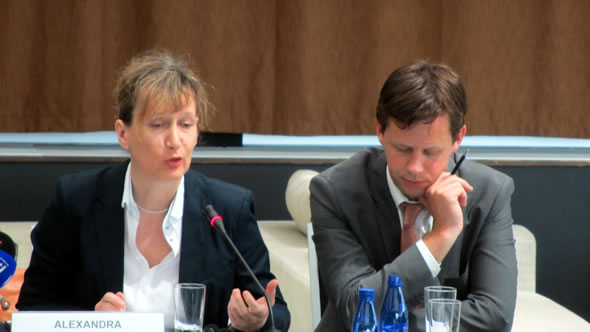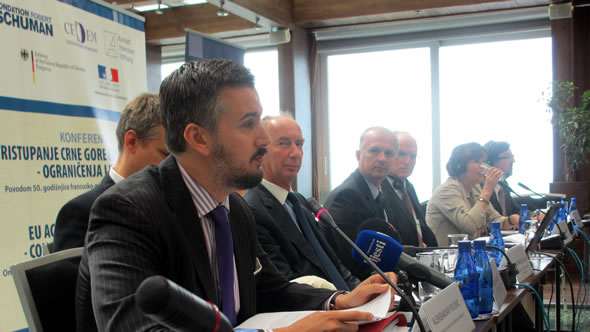Budva – ESI at conference on Montenegro's accession talks and EU enlargement

ESI Senior Analyst Alexandra Stiglmayer spoke at a conference on Montenegro's accession talks with the EU and EU enlargement to the Western Balkans in general. She underlined that enlargement is still happening, which is the good news: Croatia is joining in a few weeks, Montenegro is negotiating and Serbia is likely soon to receive a date for negotiations. But she also mentioned that there is a deepening division between those three countries and another four that seem to be stuck: Albania, Bosnia, Macedonia and Kosovo, the latter two being stuck due to external factors. She elaborated on the situation in Albania where the Electoral Code was violated in the run-up to the national elections on 23 June, which does not bode well for the elections.
After briefly discussing the situation in each country, Alexandra said that the current enlargement process is too "front-loaded", which means that candidate countries are asked to meet too many seemingly arbitrary conditions before they get to the stage of accession negotiations. This fails to capture the interest of some leaders since it is too drawn-out and abstract. It also runs counter to EU interest since much more meaningful reforms happen once negotiations begin.
Alexandra made four recommendations:
- Serbs and Macedonians were allowed to participate in the screening for chapters 23 and 24 for Montenegro, which was useful. When the next country opens negotiations, which is probably going to be Serbia, the remaining countries should be invited to all the explanatory screenings, when the European Commission explains the acquis.
- EU member states should consider how to get all the countries to the negotiation stage as soon as possible, and make the pre-negotiation stage clearer and straight-forward.
- The Commission and EU member states should consider offering all the countries including the slow (or vetoed) reformers incentives to implement part of the acquis already now. This could be done with the visa liberalisation process 2008 to 2010 in mind. During this process, Western Balkan countries implemented parts of chapters 24 (justice, freedom and security) and 23 (judiciary and fundamental rights) and received visa-free travel as a reward.
- There must be a stronger EU effort to resolve the Greek veto to accession negotiations for Macedonia. The unresolved name issue must not become a "frozen conflict" that everybody tacitly accepts. The EU should become more involved and pro-actively try to find a solution that allows Macedonia to start negotiations. Concerning Kosovo, the Commission and EU member states should be acutely aware that it will be very difficult for Kosovo to advance towards the EU as long as five member states do not recognise it and make a problem of most EU interactions with Kosovo. If Kosovo is not able to conclude a normal Stabilisation and Association Agreement with the EU, there must be a concerted effort to tackle the issue of Kosovo's EU perspective.
In response to a previous comments that Croatia may not be ready, Alexandra said Croatia was the best-prepared acceding country ever and listed what Croatia has undertaken to qualify for EU accession.
The conference was organised by the Montenegrin think-tank CEDEM (Centre for Democracy and Human Rights), the Robert Schumann Foundation, the Konrad-Adenauer-Stiftung, and the German and French Embassies to Montenegro. Other speakers included the presidents/ambassadors of the organisers, the Montenegrin Chief Negotiator Aleksandar Pejovic, the head of the EU Delegation to Montenegro Mitja Drobnic, members of the German and French parliaments, and many more. In the afternoon, the implementation of chapters 23 and 24 were discussed in detail.
Read Alexandra's speaking notes and the agenda of the conference.

